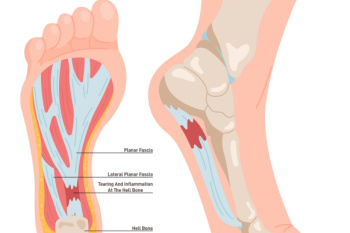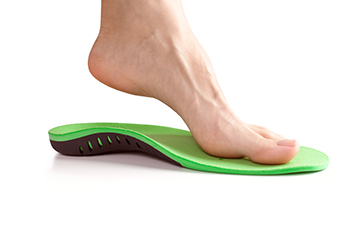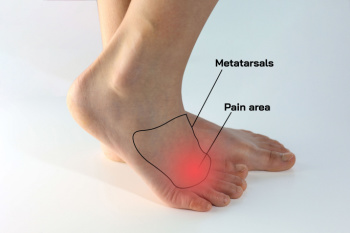Items filtered by date: July 2024
Factors for Seniors Seeking Exercise Shoes

Selecting the right exercise shoes is particularly important for seniors to ensure safety, comfort, and effectiveness during physical activity. Seniors should consider several factors when choosing footwear, such as the type of exercise they plan to do and the level of support required. The wear pattern on current shoes, foot shape, and arch support needs must also be weighed. High-impact activities such as running often call for shoes with more support, while activities like walking may require less. Analyzing the wear on old shoes can provide insights into your gait and help guide your choice. Foot shape and arch support are critical, as some feet have high arches, others are flat, and many fall inward or outward when standing. Exercise shoes should feel comfortable during extended wear and be aesthetically pleasing to encourage regular use. A podiatrist can assess your foot type, gait, and specific needs, in order to recommend the most suitable footwear to prevent injuries and enhance exercise performance. If you are looking for the right exercise shoes, it is suggested that you schedule an appointment with a podiatrist for guidance on options that are best for you to consider.
Proper foot care is something many older adults forget to consider. If you have any concerns about your feet and ankles, contact Donald Manger, DPM from Associated Podiatric Physicians, PA. Our doctor can provide the care you need to keep you pain-free and on your feet.
The Elderly and Their Feet
As we age we start to notice many changes in our body, but the elder population may not notice them right away. Medical conditions may prevent the elderly to take notice of their foot health right away. Poor vision is a lead contributor to not taking action for the elderly.
Common Conditions
- Neuropathy – can reduce feeling in the feet and can hide many life-threatening medical conditions.
- Reduced flexibility – prevents the ability of proper toenail trimming, and foot cleaning. If left untreated, it may lead to further medical issues.
- Foot sores – amongst the older population can be serious before they are discovered. Some of the problematic conditions they may face are:
- Gouging toenails affecting nearby toe
- Shoes that don’t fit properly
- Pressure sores
- Loss of circulation in legs & feet
- Edema & swelling of feet and ankles
Susceptible Infections
Diabetes and poor circulation can cause general loss of sensitivity over the years, turning a simple cut into a serious issue.
If you have any questions please feel free to contact our office located in Hamilton Township, NJ . We offer the newest diagnostic and treatment technologies for all your foot and ankle needs.
Reasons to See a Podiatrist
 Visiting a podiatrist can significantly enhance your foot health and overall mobility. Podiatrists specialize in diagnosing, treating, preventing, and rehabilitating lower limb issues. This can include general foot conditions like bunions, calluses, and fungal infections, as well as more complex problems associated with diabetes and arthritis. If you have persistent foot pain, a podiatrist can provide effective relief through treatment and exercises tailored to your specific needs. Athletes, dancers, and runners benefit from a podiatrist’s expertise in managing sports injuries, such as sprains and fractures. Custom orthotics are another vital service provided by podiatrists. These specially designed shoe inserts can correct biomechanical issues, alleviate pain, and enhance walking or running performance. Podiatrists also offer essential footwear advice, helping individuals select the right shoes to support and improve their gait. Additionally, they perform minor surgeries for skin and nail concerns, such as ingrown nails and warts. By addressing foot problems early, podiatrists help prevent further complications, enhancing your quality of life and mobility. If you are suffering from foot, toe, or ankle pain, it is suggested that you schedule an appointment with a podiatrist for an exam, diagnosis, and treatment options.
Visiting a podiatrist can significantly enhance your foot health and overall mobility. Podiatrists specialize in diagnosing, treating, preventing, and rehabilitating lower limb issues. This can include general foot conditions like bunions, calluses, and fungal infections, as well as more complex problems associated with diabetes and arthritis. If you have persistent foot pain, a podiatrist can provide effective relief through treatment and exercises tailored to your specific needs. Athletes, dancers, and runners benefit from a podiatrist’s expertise in managing sports injuries, such as sprains and fractures. Custom orthotics are another vital service provided by podiatrists. These specially designed shoe inserts can correct biomechanical issues, alleviate pain, and enhance walking or running performance. Podiatrists also offer essential footwear advice, helping individuals select the right shoes to support and improve their gait. Additionally, they perform minor surgeries for skin and nail concerns, such as ingrown nails and warts. By addressing foot problems early, podiatrists help prevent further complications, enhancing your quality of life and mobility. If you are suffering from foot, toe, or ankle pain, it is suggested that you schedule an appointment with a podiatrist for an exam, diagnosis, and treatment options.
If you are dealing with pain in your feet and ankles, you may want to seek help from a podiatrist. Feel free to contact Donald Manger, DPM from Associated Podiatric Physicians, PA. Our doctor can provide the care you need to keep you pain-free and on your feet.
What Is a Podiatrist?
A podiatrist is a doctor of podiatric medicine who diagnoses and treats conditions of the foot, ankle, and related structures of the leg. Your podiatrist may specialize in a certain field such as sports medicine, wound care, pediatrics, and diabetic care. Podiatrists have the ability to become board certified through training, clinical experience, and then taking an exam.
What Do Podiatrists Do?
On a daily basis, a podiatrist may perform the following activities:
- Diagnose foot ailments such as ulcers, tumors, fractures, etc.
- Use innovative methods to treat conditions
- Use corrective orthotics, casts, and strappings to correct deformities
- Correct walking patterns and balance
- Provide individual consultations to patients
It is very important that you take care of your feet. It’s easy to take having healthy feet for granted, however foot problems tend to be among the most common health conditions. Podiatrists can help diagnose and treat a variety of feet related conditions, so it is crucial that you visit one if you need assistance.
If you have any questions please feel free to contact our office located in Hamilton Township, NJ . We offer the newest diagnostic and treatment technologies for all your foot and ankle needs.
The Pain of Plantar Fasciitis
 Plantar fasciitis causes heel pain, resulting from inflammation of the plantar fascia, the thick band of tissue that runs along the bottom of the foot and connects the heel bone to the toes. It typically occurs due to repetitive strain or overuse, often seen in runners, individuals with high arches or flat feet, and those who stand for prolonged periods. The pain from plantar fasciitis is usually sharp and most intense with the first steps in the morning or after periods of inactivity. It may decrease with movement but can return after long periods of standing or walking. Relief can consist of rest, stretching exercises, and taking anti-inflammatory medication. Wearing supportive shoes and using orthotic inserts can also help. Preventative measures involve maintaining a healthy weight, performing regular foot stretches, and avoiding excessive strain on the feet. If left untreated, plantar fasciitis can lead to chronic heel pain and other complications. If you have heel pain, it is suggested that you visit a podiatrist for a proper diagnosis and an effective treatment plan.
Plantar fasciitis causes heel pain, resulting from inflammation of the plantar fascia, the thick band of tissue that runs along the bottom of the foot and connects the heel bone to the toes. It typically occurs due to repetitive strain or overuse, often seen in runners, individuals with high arches or flat feet, and those who stand for prolonged periods. The pain from plantar fasciitis is usually sharp and most intense with the first steps in the morning or after periods of inactivity. It may decrease with movement but can return after long periods of standing or walking. Relief can consist of rest, stretching exercises, and taking anti-inflammatory medication. Wearing supportive shoes and using orthotic inserts can also help. Preventative measures involve maintaining a healthy weight, performing regular foot stretches, and avoiding excessive strain on the feet. If left untreated, plantar fasciitis can lead to chronic heel pain and other complications. If you have heel pain, it is suggested that you visit a podiatrist for a proper diagnosis and an effective treatment plan.
Plantar fasciitis is a common foot condition that is often caused by a strain injury. If you are experiencing heel pain or symptoms of plantar fasciitis, contact Donald Manger, DPM from Associated Podiatric Physicians, PA. Our doctor can provide the care you need to keep you pain-free and on your feet.
What Is Plantar Fasciitis?
Plantar fasciitis is one of the most common causes of heel pain. The plantar fascia is a ligament that connects your heel to the front of your foot. When this ligament becomes inflamed, plantar fasciitis is the result. If you have plantar fasciitis you will have a stabbing pain that usually occurs with your first steps in the morning. As the day progresses and you walk around more, this pain will start to disappear, but it will return after long periods of standing or sitting.
What Causes Plantar Fasciitis?
- Excessive running
- Having high arches in your feet
- Other foot issues such as flat feet
- Pregnancy (due to the sudden weight gain)
- Being on your feet very often
There are some risk factors that may make you more likely to develop plantar fasciitis compared to others. The condition most commonly affects adults between the ages of 40 and 60. It also tends to affect people who are obese because the extra pounds result in extra stress being placed on the plantar fascia.
Prevention
- Take good care of your feet – Wear shoes that have good arch support and heel cushioning.
- Maintain a healthy weight
- If you are a runner, alternate running with other sports that won’t cause heel pain
There are a variety of treatment options available for plantar fasciitis along with the pain that accompanies it. Additionally, physical therapy is a very important component in the treatment process. It is important that you meet with your podiatrist to determine which treatment option is best for you.
If you have any questions, please feel free to contact our office located in Hamilton Township, NJ . We offer the newest diagnostic and treatment technologies for all your foot care needs.
Are Bunions Affecting Your Everyday Life?
Orthotics Can Help With Arch Support

Proper arch support is essential for maintaining foot health and preventing discomfort. While over-the-counter arch supports are available at many sports and shoe stores, custom orthotics prescribed by a podiatrist can offer personalized relief for those suffering from arch pain. These medical devices are designed and created specifically for your foot. Customized orthotics for arch support help to rebuild the foot’s natural strength by providing targeted support, thereby preventing further injury and aiding in the repair of existing damage. The rigidity of these supports ensures that the arches remain elevated while allowing some flexibility for natural movement. In severe cases, continuous support methods like taping can be beneficial, providing consistent arch stability even when barefoot. Consulting with a podiatrist is vital for ensuring the proper fit and function of your orthotic device, as improperly fitted supports can cause additional harm. If you are experiencing arch pain, it is suggested that you make an appointment with a podiatrist for an exam and treatment.
If you are having discomfort in your feet and would like to try orthotics, contact Donald Manger, DPM from Associated Podiatric Physicians, PA. Our doctor can provide the care you need to keep you pain-free and on your feet.
What Are Orthotics?
Orthotics are inserts you can place into your shoes to help with a variety of foot problems such as flat feet or foot pain. Orthotics provide relief and comfort for minor foot and heel pain but can’t correct serious biomechanical problems in your feet.
Over-the-Counter Inserts
Orthotics come in a wide variety of over-the-counter inserts that are used to treat foot pain, heel pain, and minor problems. For example, arch supports can be inserted into your shoes to help correct overarched or flat feet, while gel insoles are often used because they provide comfort and relief from foot and heel pain by alleviating pressure.
Prescription Orthotics
If over-the-counter inserts don’t work for you or if you have a more severe foot concern, it is possible to have your podiatrist prescribe custom orthotics. These high-quality inserts are designed to treat problems such as abnormal motion, plantar fasciitis, and severe forms of heel pain. They can even be used to help patients suffering from diabetes by treating foot ulcers and painful calluses and are usually molded to your feet individually, which allows them to provide full support and comfort.
If you are experiencing minor to severe foot or heel pain, it’s recommended to speak with your podiatrist about the possibilities of using orthotics. A podiatrist can determine which type of orthotic is right for you and allow you to take the first steps towards being pain-free.
If you have any questions please contact our office located in Hamilton Township, NJ . We offer the newest diagnostic and treatment technologies for all your foot and ankle needs.
Nerve Pain in the Foot

Experiencing nerve pain in your foot can impact your daily activities and overall quality of life. One common cause of such pain is Morton's neuroma, a condition where a nerve in the ball of the foot becomes swollen or thickened. This often results from wearing shoes that squeeze the toes together for extended periods, such as high-heeled, tight, or narrow footwear. Symptoms of Morton's neuroma can include a sharp, burning pain in the foot that intensifies with walking and a sensation of a small lump in the ball of the foot, typically between the third and fourth toes. Diagnosis usually involves a physical exam and may require imaging tests like ultrasound, X-ray, or MRI scans to confirm. Switching to shoes that allow ample room for the toes and reducing activities that exacerbate the pain may provide relief. If these measures are insufficient, special pads or devices to spread the toes, steroid injections, or in severe cases, surgery, may be recommended to alleviate symptoms. Persistent nerve pain should not be ignored, as early intervention can prevent further complications. If you are experiencing such pain, consulting a podiatrist is suggested for a comprehensive evaluation and appropriate treatment plan.
Morton’s neuroma is a very uncomfortable condition to live with. If you think you have Morton’s neuroma, contact Donald Manger, DPM of Associated Podiatric Physicians, PA. Our doctor will attend to all of your foot care needs and answer any of your related questions.
Morton’s Neuroma
Morton's neuroma is a painful foot condition that commonly affects the areas between the second and third or third and fourth toe, although other areas of the foot are also susceptible. Morton’s neuroma is caused by an inflamed nerve in the foot that is being squeezed and aggravated by surrounding bones.
What Increases the Chances of Having Morton’s Neuroma?
- Ill-fitting high heels or shoes that add pressure to the toe or foot
- Jogging, running or any sport that involves constant impact to the foot
- Flat feet, bunions, and any other foot deformities
Morton’s neuroma is a very treatable condition. Orthotics and shoe inserts can often be used to alleviate the pain on the forefront of the feet. In more severe cases, corticosteroids can also be prescribed. In order to figure out the best treatment for your neuroma, it’s recommended to seek the care of a podiatrist who can diagnose your condition and provide different treatment options.
If you have any questions, please feel free to contact our office located in Hamilton Township, NJ . We offer the newest diagnostic and treatment technologies for all your foot care needs.

